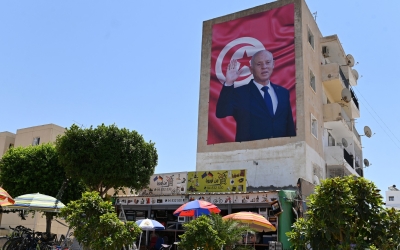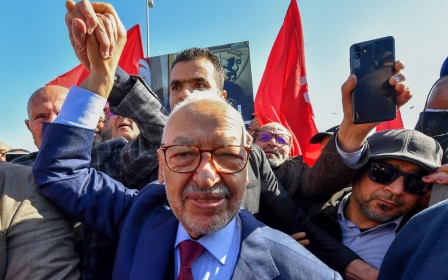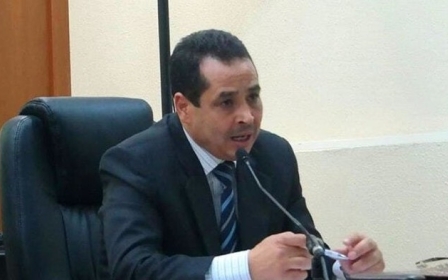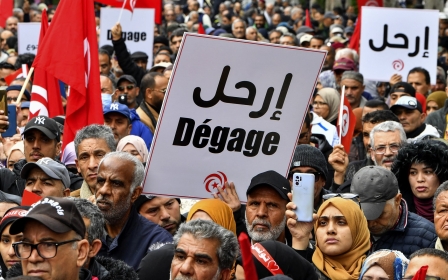Tunisia president warns of sub-Saharan immigration in 'racist' outburst
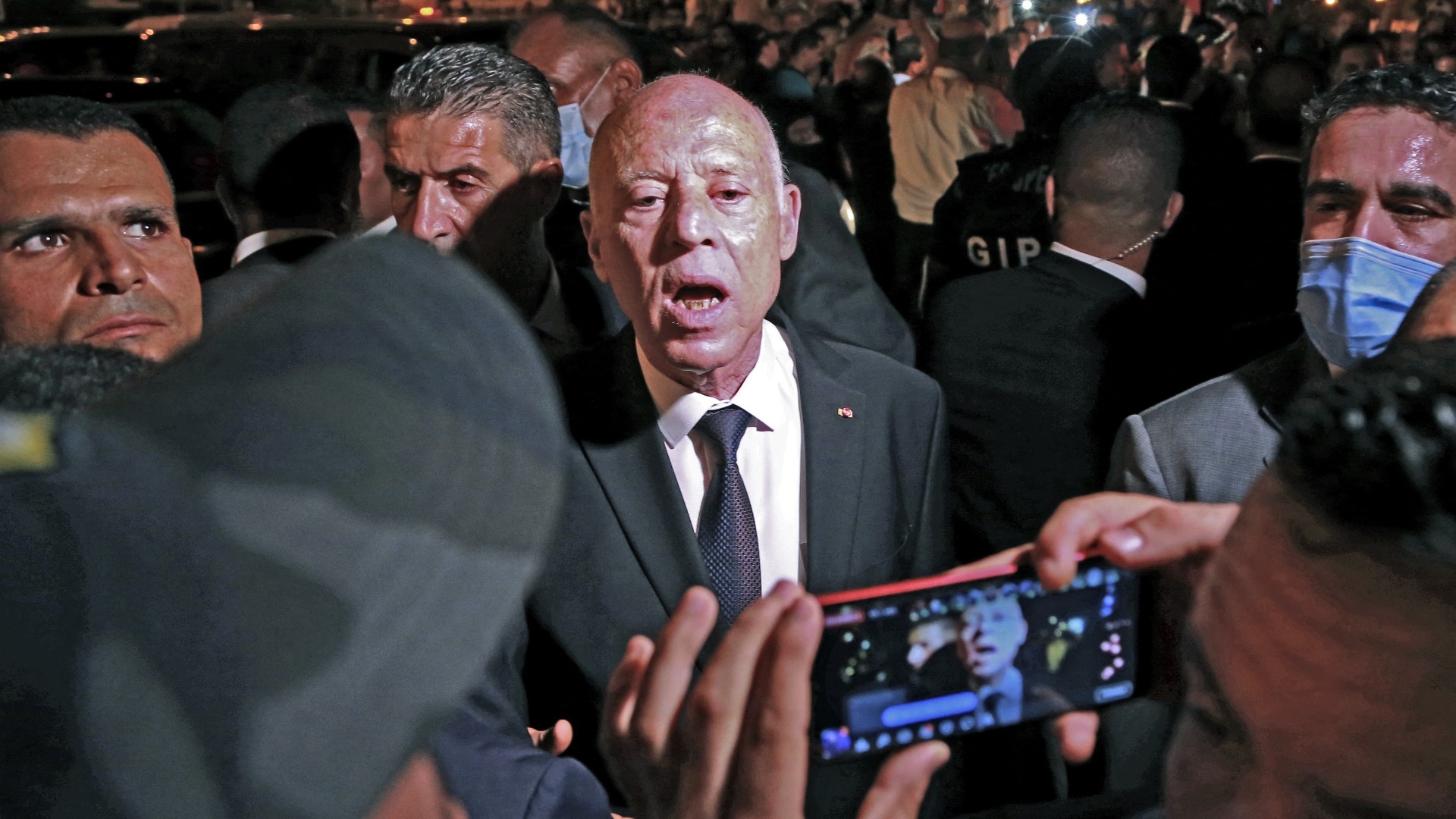
Tunisian President Kais Saied on Tuesday linked people from sub-Saharan Africa in the country to criminality, in comments that have been widely denounced as racist.
In a statement released on Facebook, following a National Security Council meeting, the president said: "There has been a criminal plan since the beginning of the century to change the demographic structure of Tunisia and there are parties that received large sums of money after 2011 for the settlement of illegal immigrants from sub-Saharan Africa.
"The undeclared goal of the successive waves of illegal immigration is to consider Tunisia a purely African country that has no affiliation to the Arab and Islamic nations."
'Saied's interest is to give the people something that they can feed off while he’s arresting his political opponents'
- Amine Snoussi, analyst
Saied added that there was a need to "put an end to this phenomenon quickly, especially as the uncontrolled immigrants from sub-Saharan Africa continue with violence [and] unacceptable crimes".
In recent years, Tunisia has been a key transit hub for people from other African countries crossing the Mediterranean to enter Europe.
New MEE newsletter: Jerusalem Dispatch
Sign up to get the latest insights and analysis on Israel-Palestine, alongside Turkey Unpacked and other MEE newsletters
Activists and campaigners have long criticised hate speech directed towards African migrants and refugees in the country, including recent social media campaigns urging authorities to stop those attempting to reach Europe.
"There are two different motivations [behind the outburst]. First is to shift the responsibility of the economic crisis on the shoulder of immigrants," Amine Snoussi, a journalist and analyst who has written three books on Tunisian politics, told Middle East Eye.
"The second interest for Saied is to give the people something that they can feed off while he’s arresting his political opponents."
In recent days, authorities have detained several government critics as part of a crackdown decried as another part of Saied’s ongoing power grab.
"These ideas and policies are perfectly consistent with Saied's scapegoating strategies," tweeted academic and Tunisia analyst Mohamed Dhia Hammami.
"After putting all the blame on his domestic opponents and depicting them as traitors and conspirators, he's now attacking immigrants using the old tropes associating black people with violence and criminality."
Last week, the Association of African Students and Interns in Tunisia released a statement denouncing a "systemic campaign of control and arrests" by security forces targeting black immigrants.
In recent months, the little-known Tunisian Nationalist Party has used social media to spread a baseless conspiracy theory that outside forces were colluding to alter the demographics of Tunisia.
'Great replacement'
Several social media users likened Saied’s comment to the notion of "the great replacement", a conspiracy theory that white people in Europe are being usurped by foreigners, mainly from Africa and the Middle East.
"Kais Saied repeating racist grand replacement-type theories that so many Tunisians have been saying as passing comments for very long," said Shreya Parikh, a researcher on black and Arab identity.
Eric Zemmour, a far-right French political figure who ran for president last year, endorsed Saied’s comments.
"The Maghreb countries themselves are beginning to sound the alarm in the face of the surge in migration… Tunisia wants to take urgent measures to protect its people," Zemmour tweeted. "What are we waiting for to fight against the Great Replacement?"
Zemmour, who received seven percent of votes in the first round of the election, built his political offering around the conspiracy theory and anti-immigrant rhetoric.
"It's really something. Zemmour, who spent two years talking about conspiracies of Algerian, Moroccan and Tunisian immigrants, now supporting Kais Saied's theories," Snoussi told MEE.
"It just goes to show that 'post-fascism' is similar whatever the country."
He added that such rhetoric had already resulted in harassment of some immigrants in the south of the country, and would continue to do so.
Black Tunisians make up between 10 and 15 percent of the population.
Tunisia's parliament adopted a law criminalising racist speech, incitement to hatred and discrimination in October 2018.
A survey by Arab Barometer last year found Tunisia to be the most conscious in the Middle East and North Africa of racial discrimination and anti-Blackness, with 80 percent agreeing that the former was a problem in the country, and 63 percent agreeing with the latter.
"[Saied] is trying to reshape people's views on racial issues by playing on the rhetoric of security, crime and Arab identity," Hammami told MEE.
"But...the backlash and radical rejection we're seeing now is in line with what the Arab barometer was showing. "
He added that widespread denunciation of the comments online showed that there was a clear awareness about the harms of anti-Black racism in Tunisia.
Tunisia has been engulfed in political and economic crises since July 2021, when Saied unilaterally suspended parliament and dissolved the government in what many have called a "constitutional coup".
He subsequently ruled by decree, before pushing through a new constitution that enshrined his one-man rule.
"We are quickly destroying everything we've built in the last 10 years, from democracy to anti-racism," Snoussi said.
"If I was Black in Tunisia, I'd probably leave and search for a safer country. A country where the president doesn't point at me over economic issues."
Houda Mzioudet, a Tunisia researcher, told MEE that the rhetoric was of concern to all Black people in the country.
"This certainly represented a backlash on the anti-racism campaign[ing] of civil society activists and their hard work since 2011. It sends a worrisome message that they may be targeted too for simply looking 'African'".
"The general hysteria compounded with Saied’s paranoid persona and his belief in conspiracy theory does not bode well for black [people] in Tunisia."
Middle East Eye delivers independent and unrivalled coverage and analysis of the Middle East, North Africa and beyond. To learn more about republishing this content and the associated fees, please fill out this form. More about MEE can be found here.


